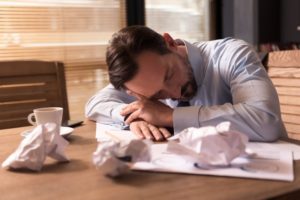 In the middle of the afternoon when your eyelids are getting heavy, it can be tempting to put your head down for a quick nap. Surely that’ll let you get some energy back, right? Well, it depends. There are plenty of cases ways that napping can be beneficial, but it can have some negative effects as well, especially if you suffer from sleep apnea in Owings Mills. Here’s what you need to consider before deciding to get some extra shuteye.
In the middle of the afternoon when your eyelids are getting heavy, it can be tempting to put your head down for a quick nap. Surely that’ll let you get some energy back, right? Well, it depends. There are plenty of cases ways that napping can be beneficial, but it can have some negative effects as well, especially if you suffer from sleep apnea in Owings Mills. Here’s what you need to consider before deciding to get some extra shuteye.
What are the Benefits of Napping?
If you’re feeling drowsy during the day, you’ll be more prone to accidents while driving or operating heavy equipment at work. A nap can help enhance your performance overall and make it easier to avoid such mistakes; in fact, NASA has found that military pilots and astronauts who took a 40-minute nap when they felt sleepy were twice as alert when they woke up.
A brief snooze can be good for your mind as well; your brain will have a chance to relax and rejuvenate the body, which is why you’ll often feel refreshed upon awakening.
What are the Cons of Napping?
Unfortunately, naps won’t always be beneficial for everyone. In first place, some people simply have trouble falling asleep during the day, whether it’s due to the light or difficulty relaxing anywhere except their own bed. Furthermore, if a nap lasts for too long – say, more than 10 or 20 minutes – you could suffer from sleep inertia, which is the feeling of grogginess or disorientation that comes if you awake from a deep sleep. This state won’t last too long, but it can be extremely detrimental if there’s something you need to do immediately after your rest.
Finally, it should be noted that if you take a long nap (or a very ill-timed one late in the day), it can affect the length and quality of your sleep later that night.
Can Napping Help Sleep Apnea?
Sleep apnea is a disorder where breathing repeatedly stops and restarts while you’re asleep. It can increase your blood pressure and put you at risk for heart attacks and other cardiovascular diseases. Luckily, your dentist in Owing Mills can provide you with oral appliances that adjust your mouth in a way that keeps your airway open, letting you breathe normally.
If you’ve been diagnosed with sleep apnea and don’t have your appliance on hand, you should avoid napping. Otherwise you could suffer from further sleep apnea attacks. Also, for patients who find the appliance uncomfortable and need time to adjust, being more tired at bedtime will make it easier to fall asleep.
Some people function better during the day if they take a nap while others don’t. Think about your own situation and plan your day accordingly. Of course, you’ll have less of a need for napping if you get plenty of sleep at night!
About the Author
Dr. Monica M. Mattson believes that service to others is extremely important; she was a commissioned Officer in the United States Navy and has participated in a number of humanitarian projects in Japan, Australia and Singapore. She can offer a removeable oral appliance to help you get a good night’s sleep. To schedule an appointment at her practice, Diamond Dental of Owings Mills, visit her website or call (443) 394-2273.
